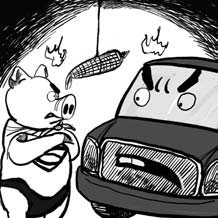 As the Western press celebrated the G8 meeting last week as a "big step forward" on climate change, the Chinese press should have highlighted the significance of the bio-energy program adopted by the State Council, the Chinese cabinet, also last week. As the Western press celebrated the G8 meeting last week as a "big step forward" on climate change, the Chinese press should have highlighted the significance of the bio-energy program adopted by the State Council, the Chinese cabinet, also last week.
It is called China's "mid- and long-term development program for renewable energy", understandably a very important government document. Unfortunately, up to now, one can only read brief reports of the premier's signing of the policy paper, and not much about its content. Also last week, the powerful National Development and Reform Commission (NDRC) issued China's "state program" on climate change. Other than uploading the lengthy document word by word from government websites, the official media have yet to provide the public with its key points. Even less has been done to explain to the public the things China is to do, and the targets it is setting to mitigate climate change. Still, the way publicity is being handled is one thing; the content of the policy is another. Even from the brief reports in the Chinese-language press, one does see explicit improvement in vision and, hopefully, also in practice from just half a year ago. In a country which bears extraordinary responsility for the world's environmental safety, every bit of progress deserves applause. According to information released Saturday from a high-level energy conference in Beijing, the central government has already decided to halt approval of any new facilities to convert corn into ethanol, a bio-fuel substitute for gasoline. Instead, the country will concentrate on bio-energy technologies based on non-grain materials which do not compete with food. If that report is confirmed, this marks a big step forward even from where China was at the end of last year. Last November China's corn price was steeply rising, due to the demand from various bio-fuel projects - some approved by the central government and some unapproved. In a chain reaction, half a year later, the higher price for corn, a major animal feed, caused pork prices to rise throughout China. In the meantime, from the last few months of 2006 to May - although the May figures are still to be officially released - the economy has been facing a new cycle of inflation, driven mainly by food prices. Some countries do not have to balance food supplies and bio-energy. They have massive farmland for growing bio-fuel crops. But what happens in China is an illustration of a problem faced by most developing countries, namely the need to maintain a balance between food and bio-energy. This is ultimately a balance between economic development and the environment. There is a double-sided risk, one that Western industrial countries are exempt from. Any mismanagement would tip the balance and, if prolonged, cause either a disastrous shortage in food supplies or more rapid climate change. Considering the Chinese lesson, if more developing countries are to be involved in mitigating climate change, the world's specialists on agricultural development must be involved in the post-Kyoto policies. This is especially true when climate change is likely to continue to cause severe changes in farming conditions. At the very least, a worldwide intelligence system is needed to monitor the use of farmland for food and energy purposes and to file timely reports on grain prices. E-mail: younuo@chinadaily.com.cn (China Daily 06/11/2007 page4)
|

